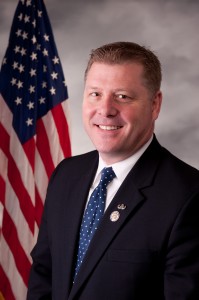
© 2016 by Steve Brawner Communications, Inc.
U.S. Rep. Rick Crawford’s 1st District in eastern Arkansas is home to half the nation’s rice acres. Cuba imports 400,000 tons of rice a year, mostly from Vietnam. So yeah, he’s for opening up trade to Cuba.
Speaking by Skype last week to a pro-trade-with-Cuba gathering at the Winthrop Rockefeller Institute on Petit Jean Mountain, Crawford said the trade embargo, in place since Oct. 19, 1960, has punished American producers instead of the Castro regime. Shipping rice from Vietnam take 36 days, versus the 36 hours it would take to ship Arkansas’ better, fresher rice, but the market is closed. Crawford, a member of a pro-Cuba trade congressional working group, has sponsored legislation that, among other provisions, would let Cuba buy rice on credit rather than requiring it to pay cash, which it doesn’t have. He’s traveling April 5-9.
Crawford isn’t the only Arkansas policymaker favoring a new approach to the communist country 90 miles off Florida’s shore. Sen. John Boozman also supports a change. He says the 55-year embargo hasn’t removed the Castro brothers from power, so it’s time to try something else – trading goods and ideas. The United States does business with worse regimes, he says, including Saudi Arabia and China. Last year, Gov. Asa Hutchinson – who helped enforce the embargo as undersecretary of the Department of Homeland Security, led a delegation of about 50 Arkansas business and government leaders to Cuba. He favors more trade without completely lifting the embargo.
Naturally, these policymakers have allies in the business community, including Arkansas Farm Bureau and Riceland Foods, both of whom see Cuba as a huge market.
Two Arkansas policymakers disagree. U.S. Senator Tom Cotton criticized President Obama as he traveled to Cuba last week, pointing out that the Castro regime arrested a human rights activist shortly before the trip. Rep. Bruce Westerman, who represents the 4th District, says opening up trade with Cuba rewards a regime that is still in power and still guilty of human rights abuses.
The state’s two other congressmen are still on the fence, sort of. Rep. French Hill, who represents the 2nd District, told KARN radio the other day that Arkansas will benefit from opening up the Cuban rice market, but he needs to see a path toward democracy and a market economy, and he’s concerned that there doesn’t appear to be a plan to make reparations to those who lost their businesses to the Castro regime. Rep. Steve Womack, from the state’s 3rd District, is still weighing the benefits and pitfalls of opening up trade, his office said.
The trade embargo began more than 55 years ago under President Eisenhower. In that time, all that’s been accomplished is that an ailing Fidel Castro was replaced by his brother, Raul. During that time, the United States has had 11 presidents. Meanwhile, the Soviet Union has gone from world superpower to historical artifact (for the moment); China has gone from closed communist country to manufacturing powerhouse; Europe’s economic borders have largely been erased; and the two Germanies have become one.
So the world has changed a lot – all except Cuba, where the Castros are still in charge.
And yet even Cuba’s past doesn’t necessarily limit its future. At the Winthrop Rockefeller Institute, Ruben Ramos Arrieta, Cuba’s minister counselor at its Economic and Trade Office in Washington, said the country has been undergoing a “transformation” since 2008. He said 80 percent of its agricultural land is state-owned, but 70 percent of that is now being used by private farmers and cooperatives. Whether or not that’s accurate, it’s notable that he described the private sector positively and that he spoke of “transformation” rather than “revolution.” Michael Bustamante, a Yale University professor with family in Cuba, said Cubans have an entrepreneurial spirit that helps them maintain an “a-legal economy” that is often ignored by the government authorities. Who knows what they could accomplish given freedom and a free market?
It’s said in sports that Father Time is undefeated. The same is true in politics. Raul Castro has said he’s leaving office in 2018, and even if he doesn’t, he’s 84 years old. Fidel Castro is 89. In the near future, somebody else is going to be Cuba’s leader.
The question for policymakers is, would that person be more influenced by a trade embargo, or by free trade?
Related: Make Cuba thirsty.
Free trade with Cuba is a no brainer.
Tom Cotton is wrong about everything. Why would anyone listen to his opinion about anything?